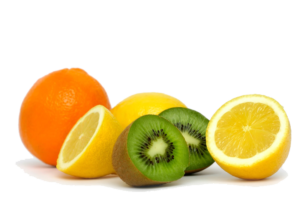Kiwi, the small, fuzzy brown fruit with a bright green interior, is not just delicious but also packed with nutrients. It is often referred to as a superfood because of its remarkable health benefits. Whether you’re looking for a tasty snack or a nutritional powerhouse, kiwi should be on your list. Let’s explore 10 key health benefits of kiwi fruit and why it’s a must-have in your diet.
1. Rich in Vitamin C: Boosts Immunity

One of the standout benefits of kiwi is its exceptionally high vitamin C content. Just one medium-sized kiwi contains more than 100% of the daily recommended intake of vitamin C, making it more potent than oranges! Vitamin C is crucial for maintaining a strong immune system, helping your body fight off infections, and boosting your body’s ability to heal from wounds. Regular consumption of kiwi can give your immune system a much-needed boost, especially during cold and flu season.
2. Promotes Digestive Health

Kiwi is a natural source of dietary fiber, which is essential for healthy digestion. The fiber content in kiwi helps regulate bowel movements, prevent constipation, and support gut health. What’s unique about kiwi is its enzyme called actinidin, which aids in the breakdown of protein. This makes it easier for your body to digest and absorb nutrients from the food you eat. If you have digestive issues or want to maintain a healthy gut, adding kiwi to your diet could make a big difference.
3. Improves Heart Health

Eating kiwi regularly can benefit your heart health in several ways. First, it helps lower blood pressure due to its potassium content, which counteracts sodium’s effect on the body. Second, kiwi’s high levels of antioxidants, such as vitamin C and vitamin E, reduce oxidative stress, which can lead to inflammation and heart disease. Studies have also shown that eating two to three kiwis per day can reduce the likelihood of blood clot formation, thereby decreasing the risk of heart attacks and strokes.
4. Supports Eye Health

Did you know that kiwi is good for your eyes, too? Kiwi contains lutein and zeaxanthin, two essential antioxidants that help protect your eyes from harmful UV rays and reduce the risk of developing eye-related conditions, such as macular degeneration. Vitamin C in kiwi also plays a role in maintaining eye health by strengthening the blood vessels in your eyes. Incorporating kiwi into your diet can keep your vision sharp as you age.
5. Aids in Weight Management

If you’re looking to lose weight or maintain a healthy weight, kiwi can be a great addition to your diet. It’s low in calories but high in fiber, which helps you feel fuller for longer periods. The fiber in kiwi slows down digestion, helping control appetite and prevent overeating. Additionally, the fruit’s natural sweetness can curb sugar cravings, making it an excellent snack for those watching their weight.
6. Enhances Skin Health

Kiwi is a beauty-boosting fruit, thanks to its abundance of vitamins and antioxidants. The high vitamin C content promotes collagen production, which is vital for maintaining skin elasticity and firmness. Regular consumption of kiwi can help reduce the appearance of wrinkles, fine lines, and other signs of aging. The antioxidants in kiwi also protect the skin from free radical damage, keeping your skin youthful and glowing. Whether you eat kiwi or use it in face masks, your skin will thank you!
7. Promotes Better Sleep

Struggling with sleep? Kiwi might help. Research has shown that eating kiwi can improve the quality of sleep and help those with sleep disorders. Kiwi is a rich source of serotonin, a neurotransmitter that plays a key role in regulating sleep patterns. Its antioxidant and anti-inflammatory properties may also aid in sleep improvement. So, having a kiwi or two before bedtime could be the natural sleep aid you need.
8. Supports Respiratory Health

Kiwi has been found to help improve respiratory conditions, particularly in children and adults suffering from asthma or chronic cough. The fruit’s high vitamin C content, combined with its antioxidant properties, helps reduce inflammation in the airways, making it easier to breathe. Studies have suggested that consuming kiwi can reduce the severity and frequency of wheezing, shortness of breath, and coughing in individuals with asthma.
9. Helps Control Blood Sugar Levels

Even though kiwi is a fruit and contains natural sugars, it has a low glycemic index (GI). This means it releases sugar into the bloodstream slowly, preventing blood sugar spikes and crashes. For people with diabetes or those at risk of developing it, kiwi is a safe and healthy fruit option. It can help regulate blood sugar levels while providing essential nutrients, fiber, and antioxidants to support overall health.
10. Boosts Mood and Reduces Stress

Kiwi’s ability to boost mood and reduce stress may surprise you, but it’s real! The fruit contains a variety of vitamins, particularly vitamin C, which has been linked to reduced levels of stress and anxiety. Vitamin C is known to support adrenal function, helping your body cope with stress more effectively. Plus, the natural serotonin found in kiwi can promote feelings of relaxation and well-being. If you’re feeling stressed or anxious, adding some kiwi to your diet could help you feel more balanced.
Conclusion
Kiwi fruit is a small yet powerful superfood with numerous health benefits. From boosting immunity to improving heart health, promoting better digestion, and even aiding in weight management, it’s clear that kiwi is more than just a tasty snack. Its rich nutrient profile, packed with vitamin C, fiber, potassium, antioxidants, and enzymes, makes it a must-have in any balanced diet.
Whether you enjoy kiwi on its own, in a smoothie, or as part of a fruit salad, you’re giving your body a healthy dose of nutrients that can improve your well-being. So next time you’re at the grocery store, don’t forget to pick up a few kiwis and experience these fantastic benefits firsthand!
